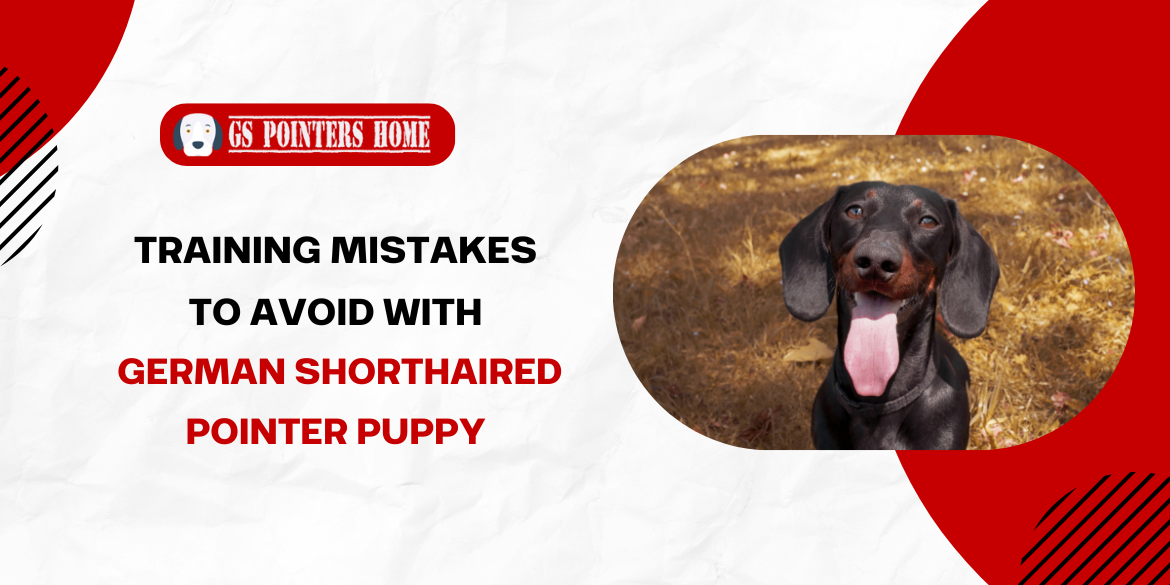The pleasure of bringing home a German Shorthair Pointer puppy is thrilling, but it also carries a lot of responsibility. These pets are bright, active, and willing to please, but in order to succeed, they must be properly trained from the start.
Early avoidance of typical mistakes will help your puppy develop into a balanced, well-behaved adult dog.
Top Mistakes to Avoid With a German Shorthair Pointer Puppy
Consistency, patience, and early socialisation are necessary during German Shorthair Pointer puppy training to prevent confusion and long-term behavioural problems. Some key mistakes to avoid while training your German Shorthaired Pointer are listed below.
1. Delaying Training Too Long
A common mistake new owners make is postponing training for too long. As early as 8 weeks of age, your German Shorthair Pointer puppy is prepared to start basic training. It is simpler to teach positive behaviour and prevent problems later on if you begin early.
2. Inconsistent Commands and Rules
The secret to training dogs is consistency. If you scold your puppy for jumping on the couch one day and let them do it the next, you’re giving them conflicting messages. Ensure that everyone in the family follows the same rules and that the same orders are used for the same acts.
3. Not Providing Enough Mental and Physical Stimulation
German Shorthaired Pointers are known for their high energy and sharp minds. A bored puppy may act out or become difficult to manage. Puzzle games, outdoor playing, and training sessions are crucial. To keep kids interested during playtime or walks, incorporate quick training exercises.
4. Using Harsh Punishments
This breed reacts far better to positive reinforcement than punishment. Strict discipline can cause anxiety and panic, which will only make behavioural issues worse. Reward positive behaviour with play, treats, or praise.
5. Ignoring Socialisation
Lack of socialization at a young age may make your puppy fearful or aggressive towards strangers, animals, or situations. In a controlled, positive manner, familiarise your German Shorthaired Pointer puppy with various environments, people, and other dogs. Playgroups or puppy classes might be an excellent place to start.
6. Being Impatient with Progress
A high-energy breed like this one requires more time to train. Your puppy won’t pick up all the knowledge right away. Remain constant, have patience, and acknowledge small victories. You and your dog may become discouraged due to frustration.
7. Overtraining or Long Sessions
Puppies don’t stay focused for much time. Long training sessions or an attempt to teach too much at once may confuse or bore your puppy. Sessions should be brief (5 to 10 minutes) and finish positively.
8. Not Teaching Recall Early
You should begin training recall as early as possible, especially because this breed has a strong hunting drive and may be tempted to chase. Before going on to more difficult conditions, start with valuable treats and practise in an atmosphere free of distractions.
Wrap Up
It takes a lot of patience, time, and effort to raise a well-mannered German Shorthaired Pointer puppy, but avoiding these training mistakes can make the process go much more smoothly.
Choose a breeder who provides early socialisation and care for their puppies if you’re still looking for the ideal companion and have been looking through German Shorthaired Pointer Puppies for Sale near Me.
Our goal at GSPointersHome is to raise German Shorthaired Pointers who are healthy, well-mannered, and prepared to become cherished members of the family.
Learn more about us from our Facebook Account.
FAQs
1. What are the weaknesses of German Shorthaired Pointers?
They may become excessively active, have separation anxiety, require continuous mental stimulation, and suffer joint or ear problems.
2. Are German Shorthaired Pointers good house dogs?
They need space, regular exercise, and instruction to be quiet and well-behaved indoors, despite their loyalty and friendliness.
3. Can you leave pointers alone?
Long-term isolation makes them unproductive, and little exercise, excitement, or attention can make them agitated or destructive.
4. What is the lifespan of a German Shorthaired Pointer?
If given the right care, healthy food, and frequent vet examinations, German Shorthaired Pointers can live for 12 to 14 years.

